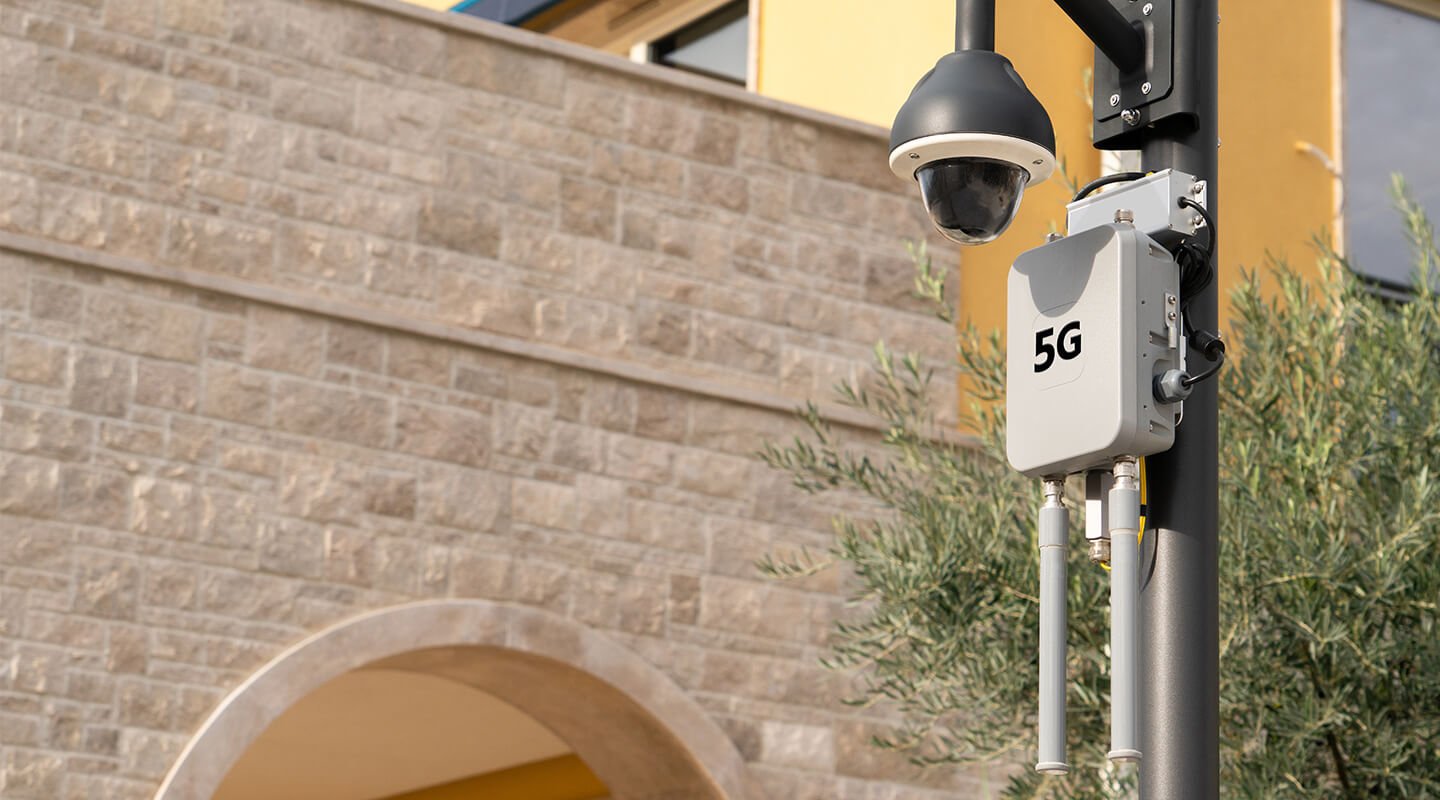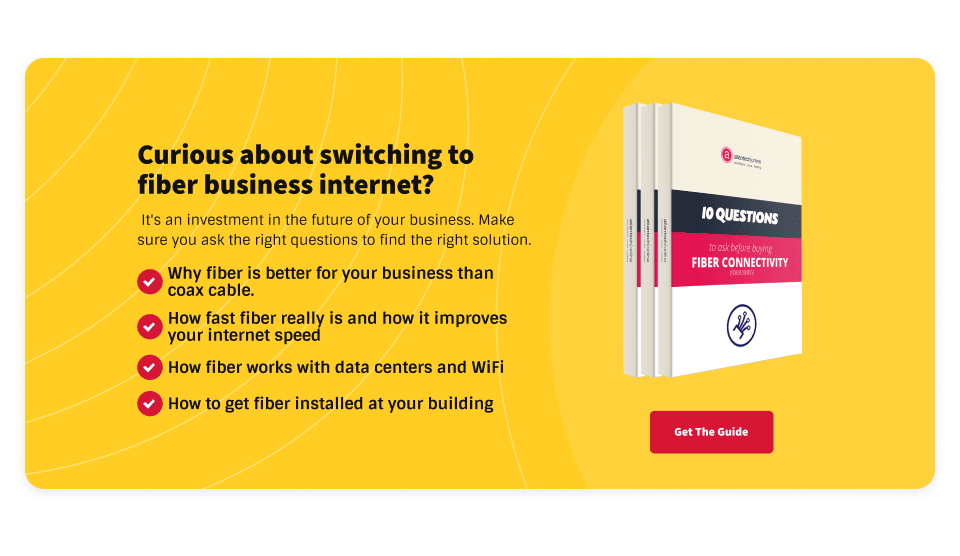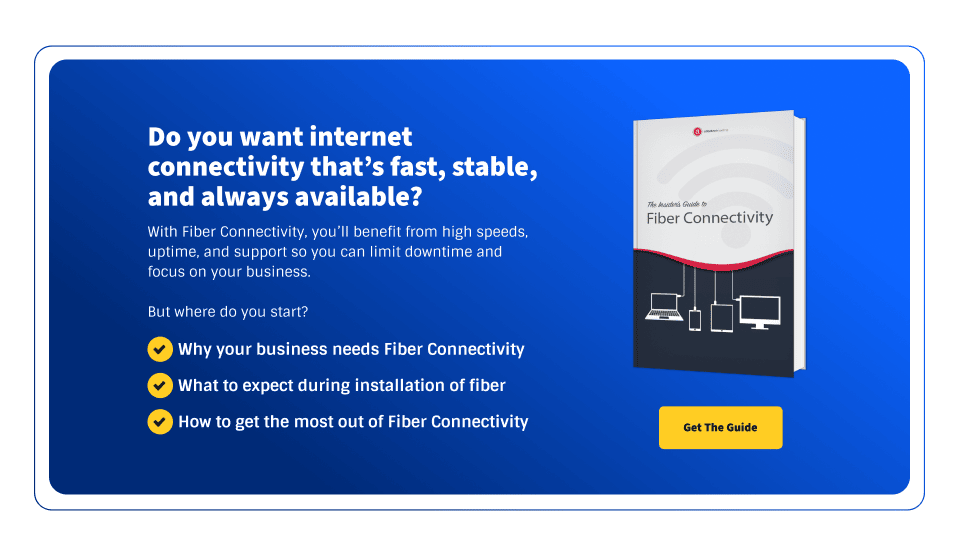5G Business Internet: 6 Reasons to be Dubious

5G business internet is meant to be the next big thing. But the technology isn't shaping up to be the telecom revolution businesses hoped it would be. It hasn’t lived up to the hype for speed, security, or any other measure that matters for quality business Internet.
So, why are the big telecom companies hyping 5G up so much right now?
They’re saying it’s the big thing for business. They claim 5G will revolutionize the way businesses communicate with customers. 5G evangelists are promising lightning-fast speeds, and a truly 'connected' future for businesses.
These are dubious claims, to say the least. And here’s why 5G isn’t going to be a game-changer like small businesses have heard. Not any time soon, at least.
6 Problems with 5G Business Internet
If you’ve been following 5G headlines, the new mobile standard is being sold as a revolution. Innovation is always exciting, but it’s also prone to a lot of hype. Understanding what 5G is — and isn’t — can separate hype from reality.
5G is the latest standard for mobile wireless that will eventually replace or augment 4G LTE. The 5G standard is technologically different than 4G or 3G in several ways, including the fact it relies on three types of wavelengths. Big telecom is working to roll out 5G this year, promising dramatically faster speeds.
Atlantech isn’t small or new, but we’re the opposite of big telecom. We’re focused on doing one thing extremely well, which is providing the best business Internet connectivity and unified cloud communications in the greater Washington DC area. If you want real customer service and cutting-edge technology, talk to us. We don’t over-promise or sell you hype, and we always deliver.
Problem #1: 5G is a Risky IoT Innovation
Where 5G is going to make a difference is in the Internet of Things (IoT). Every connected thing can have its own connection, from self-driving cars to smart street lights. 5G is an IoT technology, but it’s not even perfect for this use case.
5G will assist IoT deployment at large scale, including smart, connected cities. This could mean a sensor-driven future, except there’s one major problem. Few connected devices are engineered for security, and in the rush to deploy 5G networks, security may be compromised on the way.
Currently, 5G networks are vulnerable to device monitoring and interception. When you combine unsecured networks with unsecured connected devices, it’s the perfect breeding grounds for the biggest botnets the world has ever seen. Bigger botnets mean bigger distributed-denial-of-service (DDoS) attacks.
Learn more: What You Need to Know About DDoS Attacks
It gets worse, too.
Recently, there’s been a surge of cybercrime attacks against cities. Municipalities could be even bigger targets in the 5G era. When compromised networks are supporting power grid, water, and emergency services, there’s potential for civil chaos. This could spell serious threats to public health and safety.
The IoT is growing, and it’s becoming a more popular tool for small and mid-sized businesses (SMB). However, 5G isn’t a perfect tool for small business, and it’s not a silver bullet for small business IoT. Your best bet is to focus on IoT devices that are engineered for security and software updates, since 5G networks lack embedded security.
Problem #2: Junky, Clunky Antennas Everywhere
Municipalities are fighting 5G for numerous reasons, including the volume of antennas required. Some opponents cite aesthetic concerns. Others worry about health risks. Another percentage of local government officials are worried about a 2018 FCC order, which limited cities that gave big telecom fast-track access to permits for installing 5G antennas.
Current wireless towers are about a mile apart, roughly speaking. 5G networks require antennas every few hundred feet. Under best-case scenarios, 5G signal begins degrading at a distance of 1,000 feet, and that’s during experiments with zero interference from cars, buildings, or offloaded wireless signals.
“I don’t have an objection to 5G or deploying 5G,” Montgomery County council member-at-large Hans Riemer told CityLab. “I just want to preserve local authority to guide the deployment.” Riemer hears a lot of feedback from concerned citizens in Montgomery County.
“People see the junky, clunky installations that the industry has done in certain locations and they say 'hey, that’s not what I want in my neighborhood',” says Riemer.
Explore further: The Best Business Internet Services in Montgomery County, Maryland
Problem #3: 5G isn’t 10X Faster
If everything pans out like promised, 5G networks are going to bring ten times lower latency than 4G. In theory, you can play high-definition videos and download enormous files much faster than ever on mobile networks in the 5G era. Speedy Internet is a nice idea, but your actual experience will vary.
5G certainly has the potential to be fast, but there are numerous obstacles that stand in the way. You need to buy new, 5G enabled phones and routers to even think about a speed increase, and then you need to cross your fingers that it works.
Recently, a panel of experts admitted they weren't very hopeful.
“It’s going to take time for 5G networks to develop,” warns researcher Barry Matsumori.
Even when 5G networks reach maturity in several years' time, there’s real concern about signal strength. Higher frequency bandwidths mean shorter wavelengths.
5G has known troubles transmitting over any kind of obstacles, including human bodies and walls. You may get 10x faster speeds if you stand right next to an antenna outdoors in perfect weather conditions, but that's not a realistic way to run your business.
Learn more: Fiber, Cable, or DSL – Which Type of High-Speed Internet Is Best for Your Business?
Problem #4: 5G isn’t Secure
5G wasn’t engineered for security. It was built for capacity. One of the first use cases sold by big telecom was a crowded stadium. If you pack a bunch of smartphone-toting bodies into an open area, 5G might be the perfect solution to make sure everyone has a signal.
There’s an increasing number of concerns about 5G security vulnerabilities. Recently, 11 vulnerabilities were discovered by researchers at Purdue University and the University of Iowa. 5G flaws make it possible to track a device’s location in real-time, perform surveillance, and trigger fake emergency alerts. Mobile security concerns aren’t anything new, but this report and other analyses show that 5G has new security issues and carry-over security flaws common to 4G and 3G networks.
“We shouldn’t be expecting that 5G will somehow wipe the slate clean from a security standpoint,” says analyst Patrick Donegan.
Truthfully, we know 5G isn’t perfectly secure, but we don’t actually know how bad the problem is yet. Is that the kind of conditions you want your business data operating under? Absolutely not.
Take a queue from Switzerland, who is one of several countries who elected for a “wait and see” approach to 5G. It’s always smart to see how a new technology performs under real-world security risks before you use it.
We recommend: Risk Management: 5 Ways We Manage Our Data Center Workloads
Problem #5: 5G May Be Unsafe
5G safety is a hotly-contested issue. States, municipalities, and public interest groups worry about unforeseen health risks. We don’t actually know the health impact of high-frequency electromagnetic frequency (EMF) radiation. Industry proponents at Verizon and AT&T insist there’s little evidence that EMF exposure is harmful.
Perhaps the most balanced perspective on the issue comes from Leeka Kheifets, an epidemiology professor at UCLA’s Fielding School of Public Health. She believes we should be "at least" researching the health risks of new technologies like 5G.
“I don’t think it’s clear that there are health risks, but it’s also not clear that there are no [5G] health risks," says Kheifets.
Meteorologists are another group with serious 5G concerns. 5G satellites are likely to create interference for weather satellites that measure atmospheric vapor. Accurate weather predictions are critical to many industries, including agriculture, aviation, and utility companies.
Problem #6: 5G Doesn’t Replace fiber
5G isn’t anywhere close to replacing fiber-optic Internet connectivity for business, or even high-speed broadband Internet. You still need a fiber connection to a 5G antenna, which can involve digging, wires a connection to poles, and everything else involved with a physical installation.
Once you’re connected, good luck.
5G quality suffers with any type of interference, including distance, walls, people, or even furniture.
There’s a possibility that 5G could be a decent option for small business Internet, but it’s not going to happen anytime soon. A 5G small cell system can support up to 1,800 users at significantly greater distances. However, small cells won’t be a possibility for at least several years after the 5G roll-out. Fast, reliable Internet connectivity involves fiber or broadband, and that's not changing anytime soon.
Related: 11 Huge Business Benefits of Fiber Internet Connectivity
You Probably Shouldn't Believe the Hype About 5G Business Internet
Honestly, 5G is an exciting idea.
Ten times faster speed?
Autonomous vehicles?
Yes!
In reality, 5G isn’t anything close to what big telecom promised. Not yet, at least. The rush to roll out 5G has steamrollered over concerns about reliability, security, and safety. The standard is nowhere near close to being an option for small business Internet.
Do you really want your data being transmitted over public antennas? Do you want to do business on a network that's vulnerable to DDoS botnets or surveillance? Definitely not, and besides, speed gains are questionable.
Remember, most 5G performance testing takes place under ideal conditions outdoors. It's faster in a huge open field with zero interference or signal crowding. These don't reflect real-world conditions for business Internet, like the inside of a building.
5G business internet needs a lot of research and improvement before it’s viable. Go ahead and invest in a 5G smartphone for personal use, but stick to fiber-optic internet connectivity when it comes to your business data. Get a free, no-pressure quote from Atlantech Online on fiber Internet.


